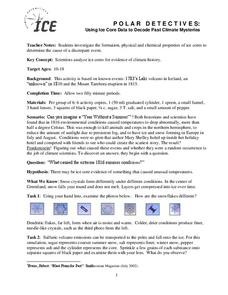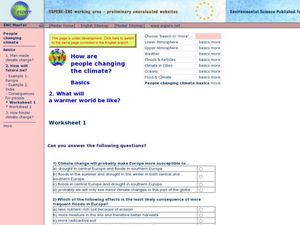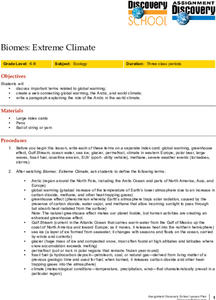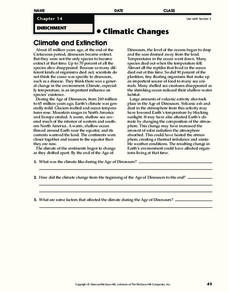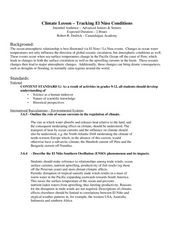Polar Trec
Polar Detectives: Using Ice Core Data to Decode Past Climate Mysteries
How does examining an ice core tell us about weather? Learners set up and explore fake ice cores made of sugar, salt, and ash to represent historical snowfall and volcanic eruptions. From their setups, scholars determine what caused the...
US Environmental Protection Agency
Sea Level: On the Rise
With the global temperature on the rise, the effects of climate change are starting to be seen. However, many people have a difficult time conceptualizing the long-term effects, such as sea levels rising. Given an easy and effective...
Curated OER
Climate and Cultures of Africa
Young scholars gain an understanding of the relationship between climate and culture in the sub- Saharan Africa. Students will complete short exercises pertaining to the various cultures of Africa and the climate in which they live....
Curated OER
Tracking Narwhals in Greenland The Ocean Unicorn
Students study the ecology, habitats, geographic range and feeding habits of narwhals. They determine at least three reasons for the decline in the narwhal populations and complete the accompanying worksheets.
Curated OER
How are People Changing the Climate: Basics
In this climate change worksheet, students answer a series of questions about climate change. Students have multiple choice options for six online quiz questions
Curated OER
Biomes: Extreme Climate
Middle schoolers create a web connecting global warming, the Arctic, and wold climate. They write a paragraph explaining the role of the Arctic in world climate.
Curated OER
Extreme Climate
Students discuss global warming, greenhouse effect, permafrost and other key words. In this climate instructional activity students create a web that connects global warming, the Arctic and world climate then write a paragraph...
Curated OER
Climatic Changes
In this weather worksheet, middle schoolers read an excerpt describing the climate and extinction. Then they explain what the climate was like during the Age of Dinosaurs. Students also determine some factors that affected the climate...
Curated OER
Biomes: Extreme Climate
Students discuss the causes of global warming. In this earth science instructional activity, students examine how global warming is connected to the arctic and world climate. They write a paragraph about their interconnection.
Weber State University
The Sun and the Seasons
Why is there more daylight in June than in December if you live above the equator? How does the angle of sunlight shift throughout the year? Answer these questions and more with an interactive article about the sun, its path through the...
Curated OER
Tracking El Nino Conditions
Students identify major changes in ocean temperatures during an El Nino season. In this climate lesson students complete an Internet assignment using datasets to determine periods of El Nino.
Curated OER
Contrails and the Climate
In this contrails and climate worksheet, students read a short article about the effects of contrails on the weather and the climate. They answer 5 questions about the article.
Curated OER
Going into the Great North
Students observe and investigate the areas included in the Great North. In this geography instructional activity, students observe a documentary based on the Great North. Later the students will draw and identify countries within the...
Curated OER
Are You an Energy Efficient Consumer?
In this energy consumption worksheet, students use on line resources to explore the energy use by different countries around the world. Students compare the amount of light emitted by different countries and their carbon dioxide...
Global Oneness Project
Reclaiming Rivers
Robert Hass's article "Rivers and Stories" underscores the importance of rivers in the development of civilization and the importance of reclaiming supposedly dead rivers and implementing policies that protect river health. Groups...
Curated OER
How Does Your Garden Grow? Discovering How Weather Patterns Affect Natural Cycles
For the warm-up in this cool climate lesson, you will need to click on "Mapping" and then "US Mapping" once you arrive at NOAA's "US Climate at a Glance" page. Earth science explorers realize that 2012 was a warm winter for us. They read...
Curated OER
Great North
Students view a video about the Arctic Circle, North Pole and Northern Europe. They locate areas using a map. They create a drawing of the countries where the Inuit live.
Curated OER
Forests of the World
In this forests worksheet, learners read a one page informational excerpt on different forests throughout the world. They then use what they learned to answer the 20 questions on the worksheet. The answers are on the last page of the...
Curated OER
Living During the Little Ice Age
Students brainstorm what living conditions during the period known as the Little Ice Age (1350-1850) might have been like. They research lifestyles, the economy, crop yields, and human and livestock mortality.
Curated OER
The Real Eve
Students research about human migration during a specific time period. In this physical science lesson, students watch a video about human evolution. They prepare a presentation on human migration and share it with the class.
Curated OER
The Little Ice Age
In this Little Ice Age instructional activity, students read about changes in weather and temperature resulting in changes in rain fall and glacier movement. Students answer three critical thinking questions about the Little Ice Age that...
Curated OER
Continental Drift Lab-Wegener's Evidence
For this continental drift worksheet, 7th graders answer 7 questions about Wegener's theory of continental drift. They use a diagram of the Earth's continents that show plate tectonics.
Curated OER
Worm Compost & Vermicomposting
Students explore vermicomposting, the species of worms needed and the proper climate for it. In this composting lesson students make their own worm compost bin.
Weather Bug
WeatherBug
Exploring the weather has never been more intriguing! Whether you are looking for a quick glance at the 10-day forecast, trying to figure out if lightning is heading your way, or wondering what the pollen count is, you will find out...


